If you thought the Youth vs. ODOT rally that’s been going on since April was the exception to the rule when it comes to high schoolers being engaged in climate change activism, you were very wrong.
Today thousands of Portland high schoolers walked out of class, hopped on buses and bikes or sidewalks, and met at the Oregon Convention Center for the Portland Youth Climate Strike. It was an inspiring turnout for anyone who cares about the planet. And a reminder to elected officials that young people are coming for them if they don’t make planet-friendly decisions.
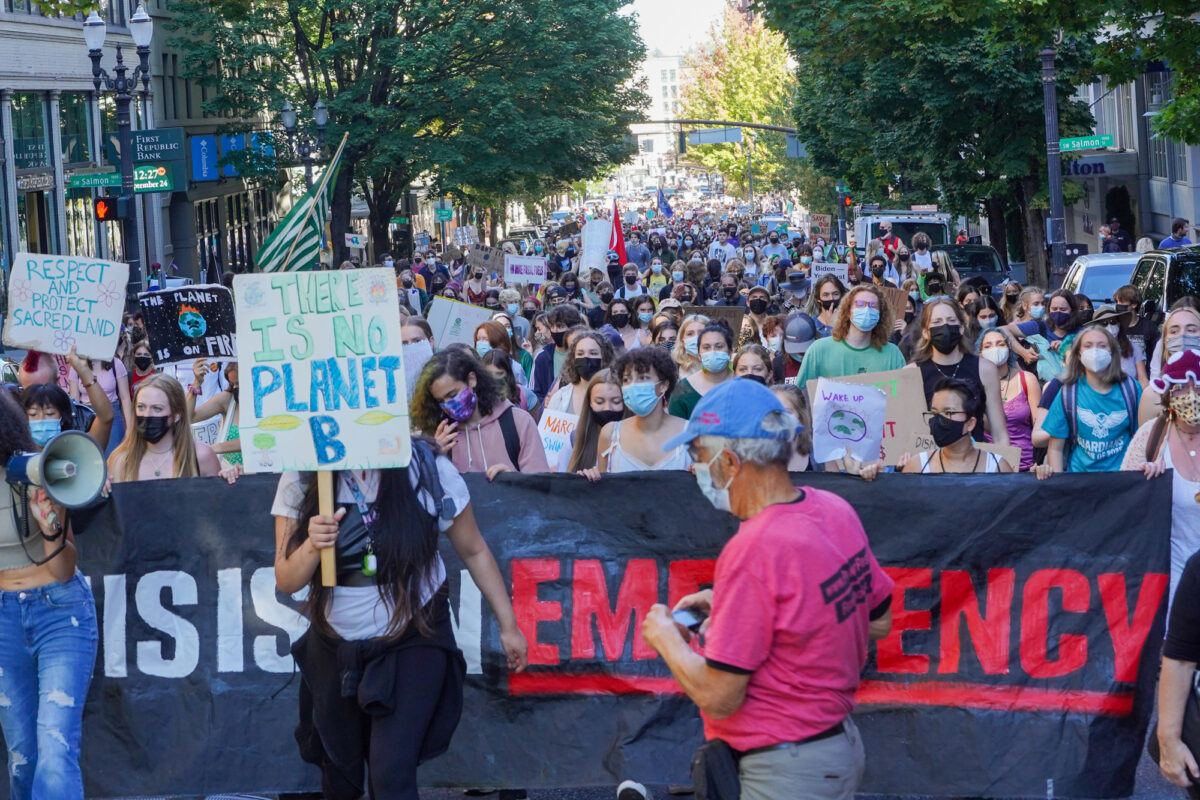
It was not just an opportunity for young people to flex their activist muscles, it was a community-building event. Speakers emphasized the need to work together to take on the challenge of climate change. One speaker from Cleveland High School said, “I would like to thank you for coming… The climate activists, the anti-establishment protester, the person who was just pressured into doing this, even the person who’s coming here to skip math class. Whether or not you’re aware, you’re an important part of this movement.”
Here’s a few of the signs I saw:
Advertisement
Also at today’s event there was deep frustration with adults and elected officials for not doing more, sooner. I was also very impressed by the substance and smarts expressed by the speakers. There was no admonishment about individual choices. These kids are pushing for systemic change. And they get it. They understand that at its root, climate change is out of control because of governments that aren’t doing enough and massive corporations that put profits over people.
I was also heartened to hear and see a strong transportation-related element among the protestors. The march intentionally stopped at ODOT Region 1 headquarters and chants included: “What do we want? No more freeways! When to we want it? Now!”. There was a lot of anti-free and anti-car sentiment.
Naomi Hemstreet, who wore a Sunrise PDX t-shirt, said she demanded an immediate moratorium on freeway building. “We must stop expanding freeways. It is time to stop making room for cars! It is time to stop promoting vehicles that emit dangerous emissions into our atmosphere. It is time to make public transportation accessible for every person in Portland. It is time to invest in pedestrian and bike infrastructure. It is time!”
There was also a strong, anti Ted Wheeler vibe. Wheeler, Portland’s unpopular mayor, is facing a recall and there were several Total Recall t-shirts in the crowd. One of the speakers, Calliope Ruskin, lamented the inaction of Wheeler and his peers since the last youth climate march. “This is our city hall!” Ruskin shouted. And then she led the crowd in a chant of “Ted let’s talk! Ted let’s talk!”
Organizers set out five chairs (below) with the names of Wheeler and the four other Portland city commissioners on them. It was a symbolic gesture because the chairs remained empty for the entire event.
Danny Cage (above), the 17-year-old youth committee chair of the NAACP Portland chapter, member of Sunrise PDX, and an organizer working on the Ted Wheeler recall, was one of the most engaging speakers of the day. He encouraged the crowd to not center whiteness (as great as Greta Thunberg is) and to remember that the root causes of climate change are built on a bedrock on white supremacy. Cage also quoted Malcolm X and warned of being satisfied with incremental progress in the name of “wins”.
Cage got a rousing response when he said, “We must stop being comfortable with small, symbolic wins in the name of progress. As Malcolm X once said, ‘If you stick a knife in my back nine inches and pull it out only six, there is no progress. If you pull it out all the way it’s not progress. Progress is healing the wound that the knife made and they haven’t even pulled it out, much less healed the wound. They won’t even admit the knife is there.’
“We must stop waiting for a revolution,” Cage proclaimed. “Because we are in one.”
Check out more photos from the event below:
— Jonathan Maus: (503) 706-8804, @jonathan_maus on Twitter and jonathan@bikeportland.org
— Get our headlines delivered to your inbox.
— Support this independent community media outlet with a one-time contribution or monthly subscription.



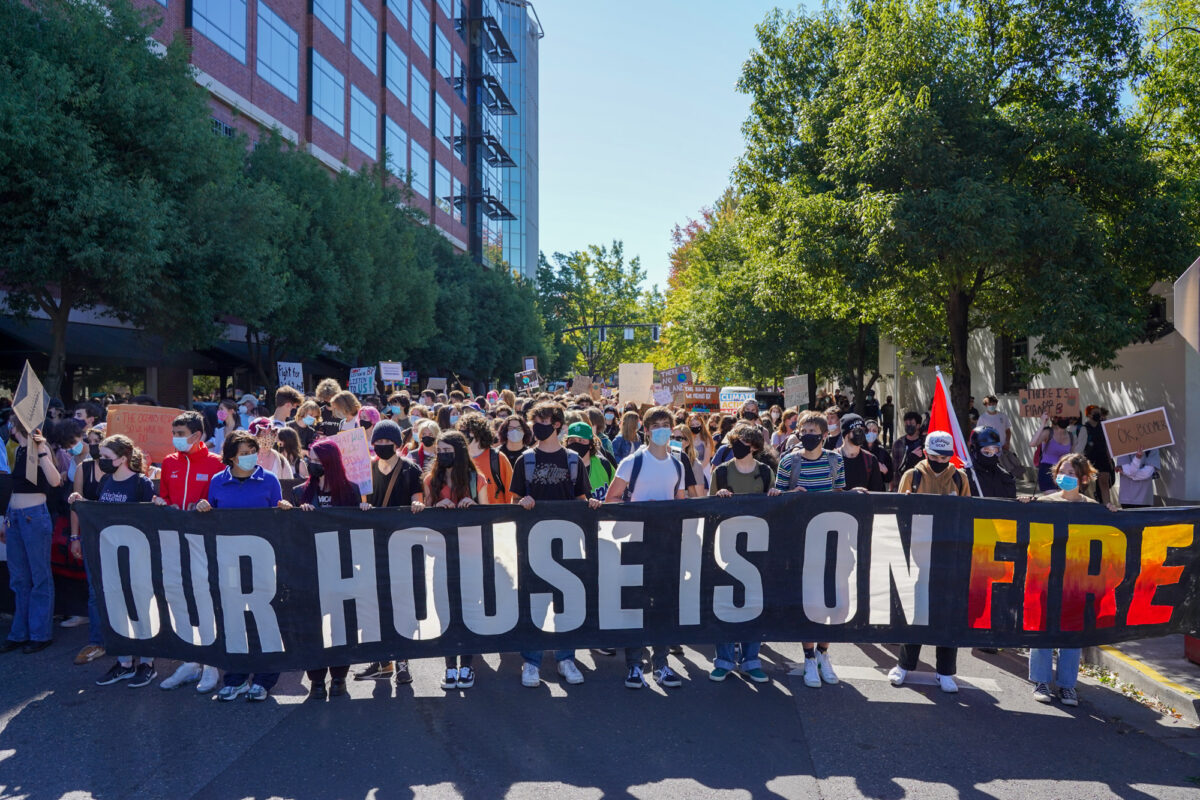
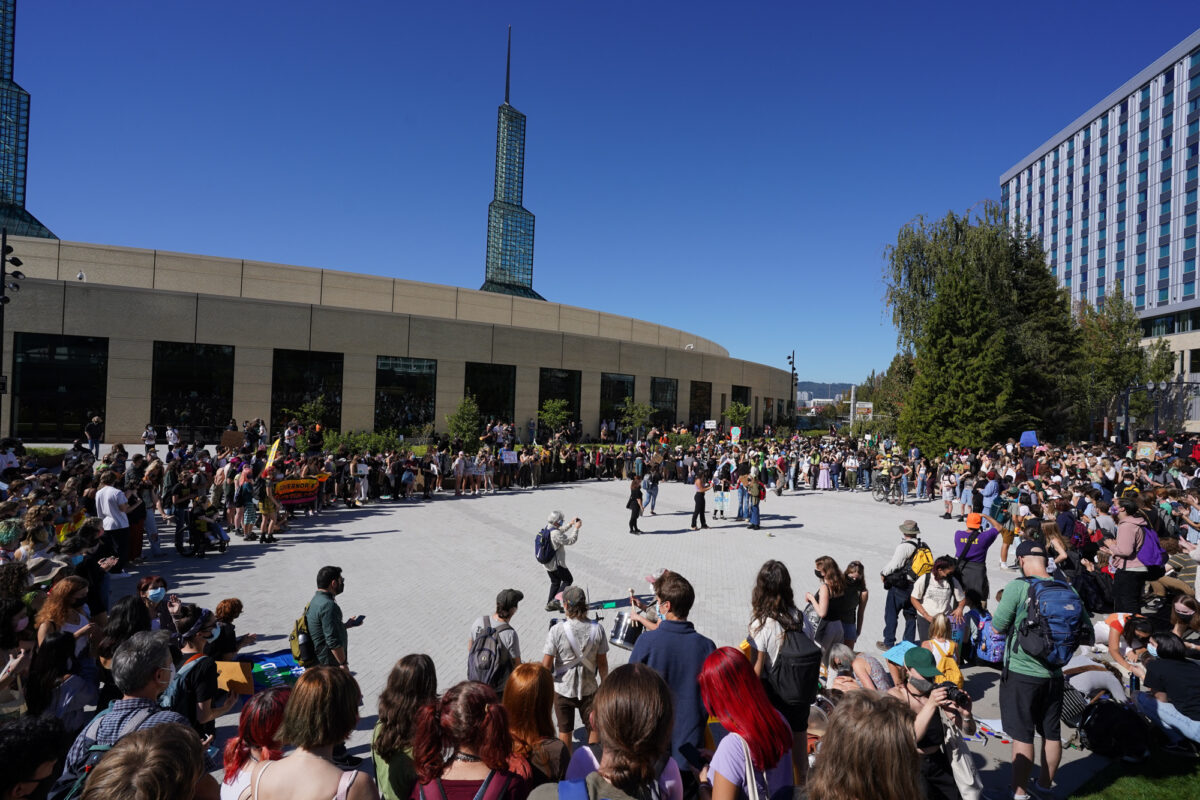
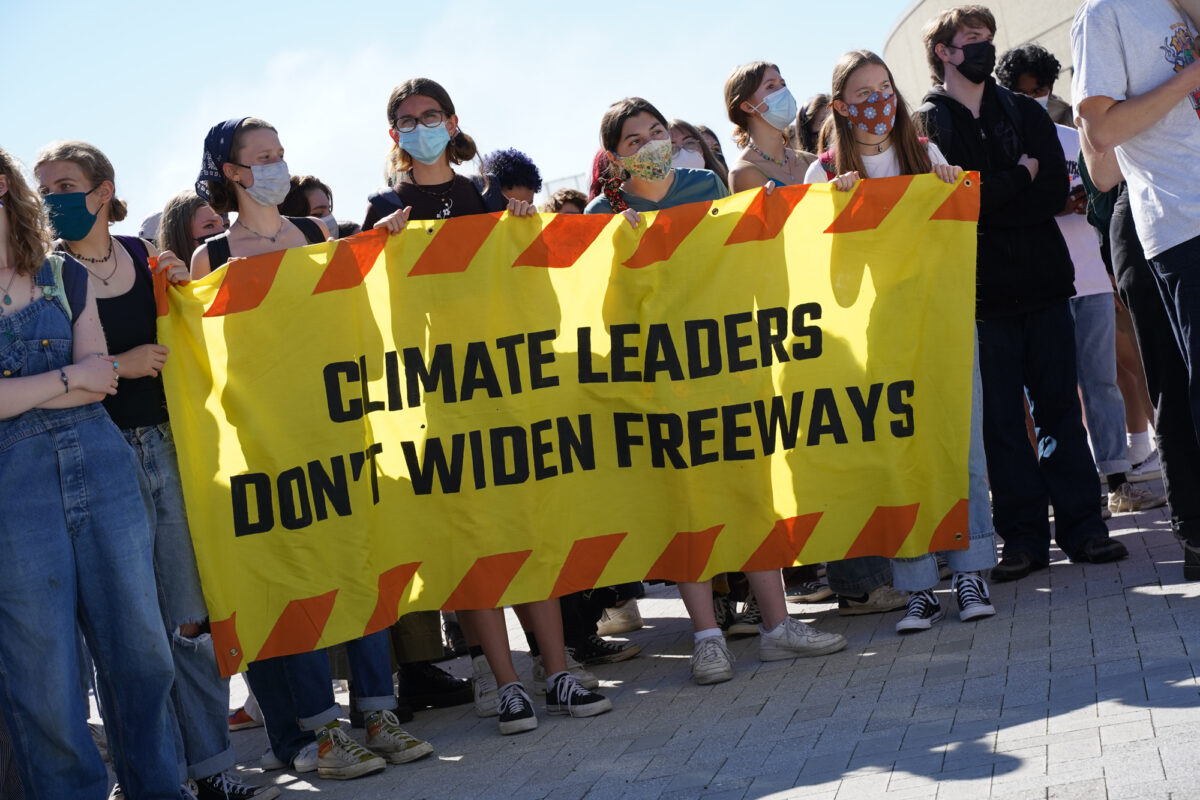

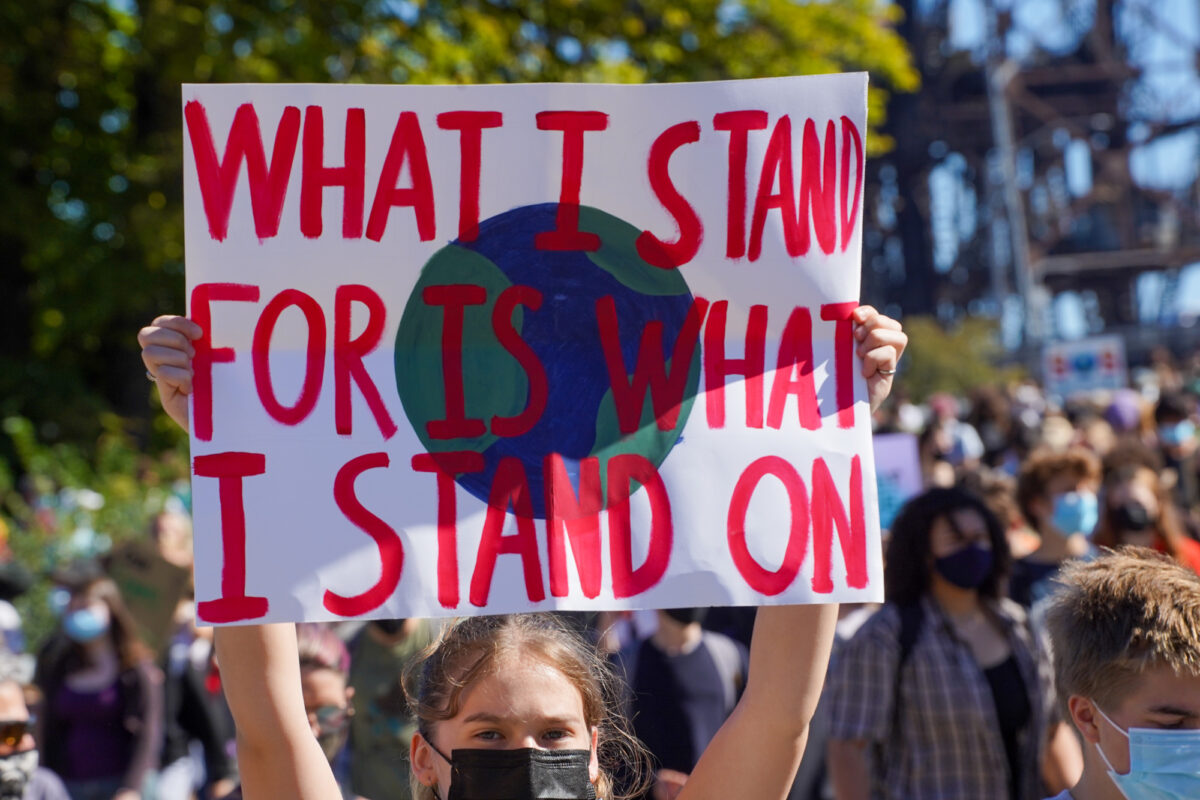

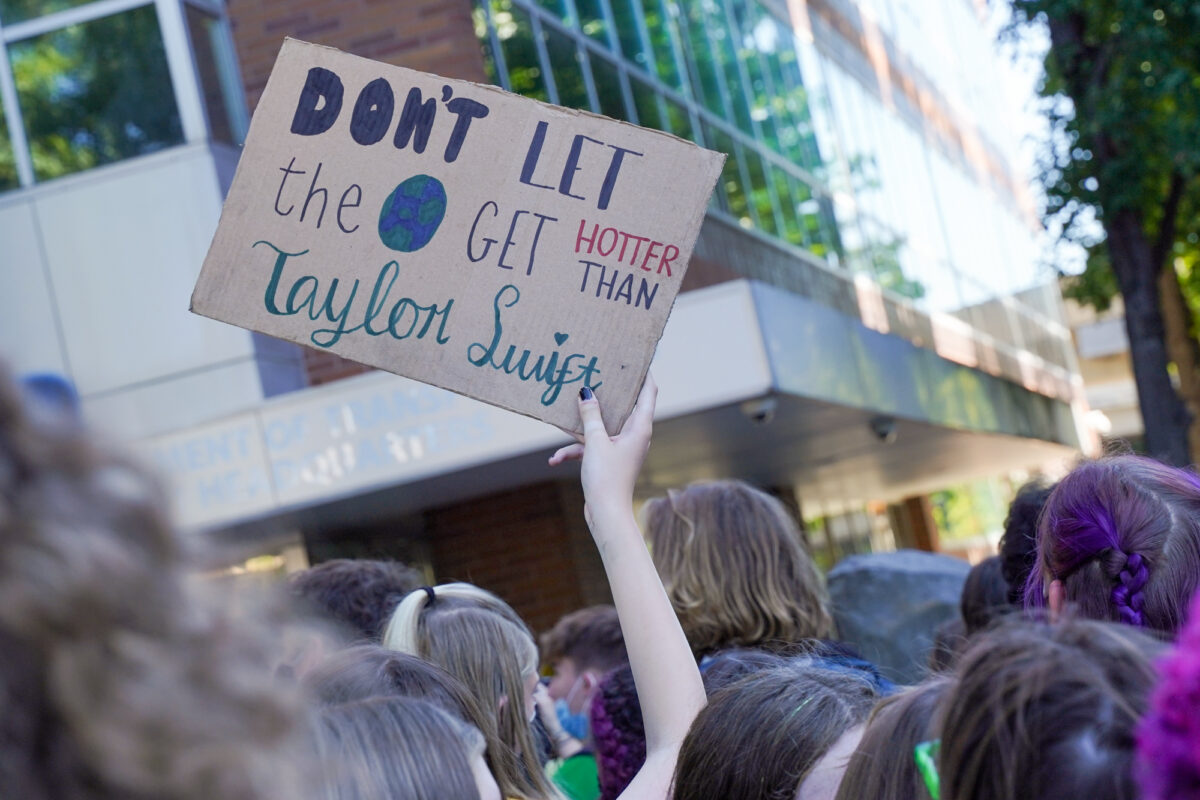
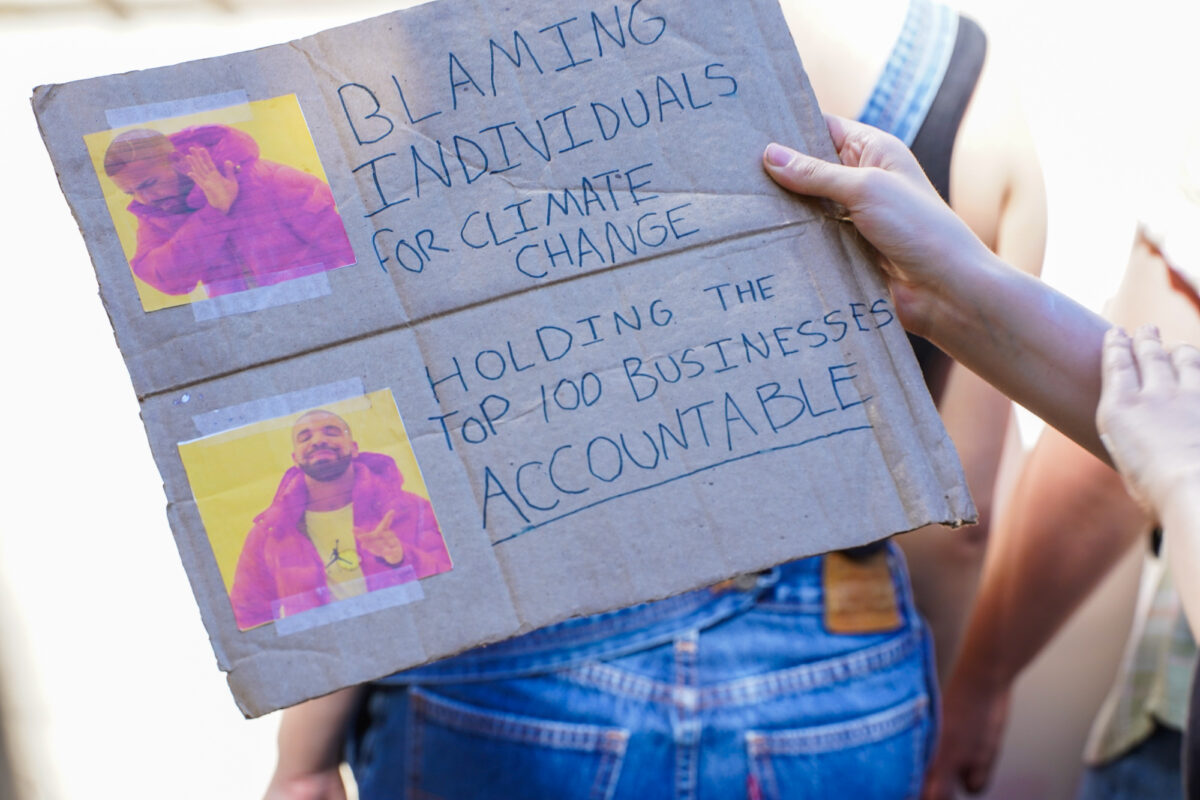
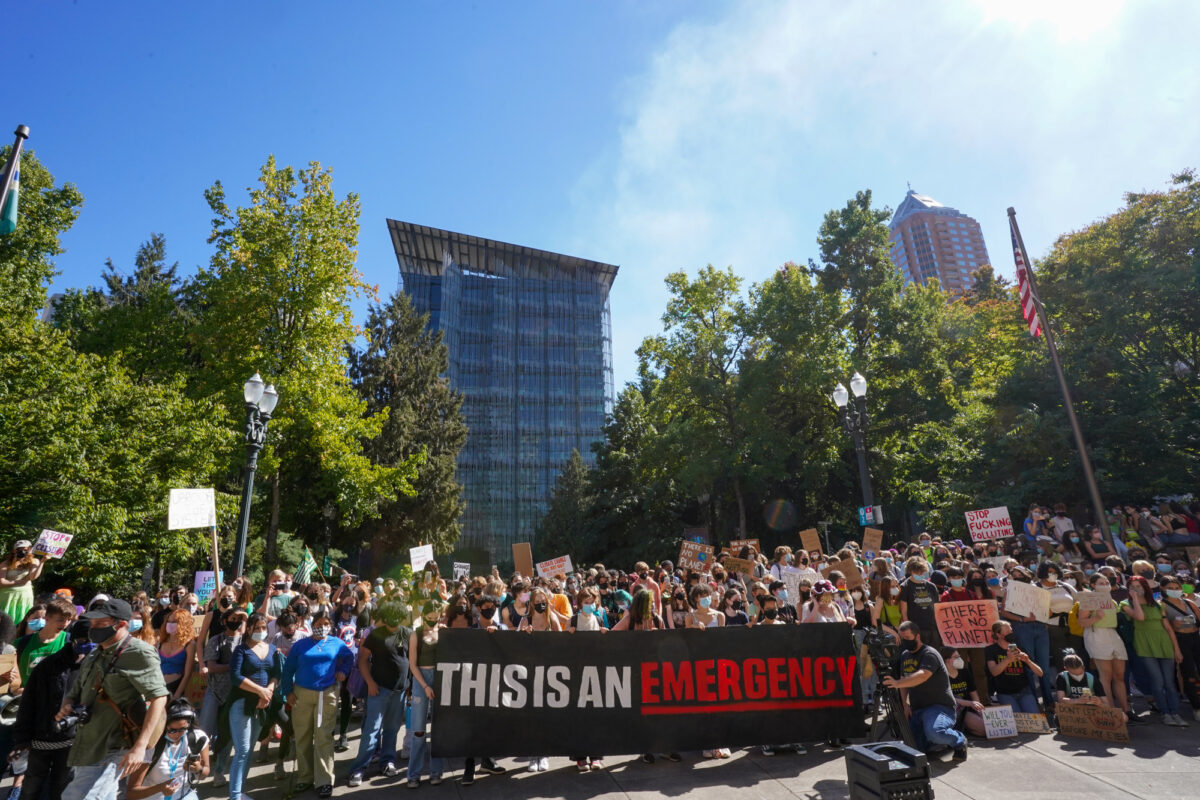
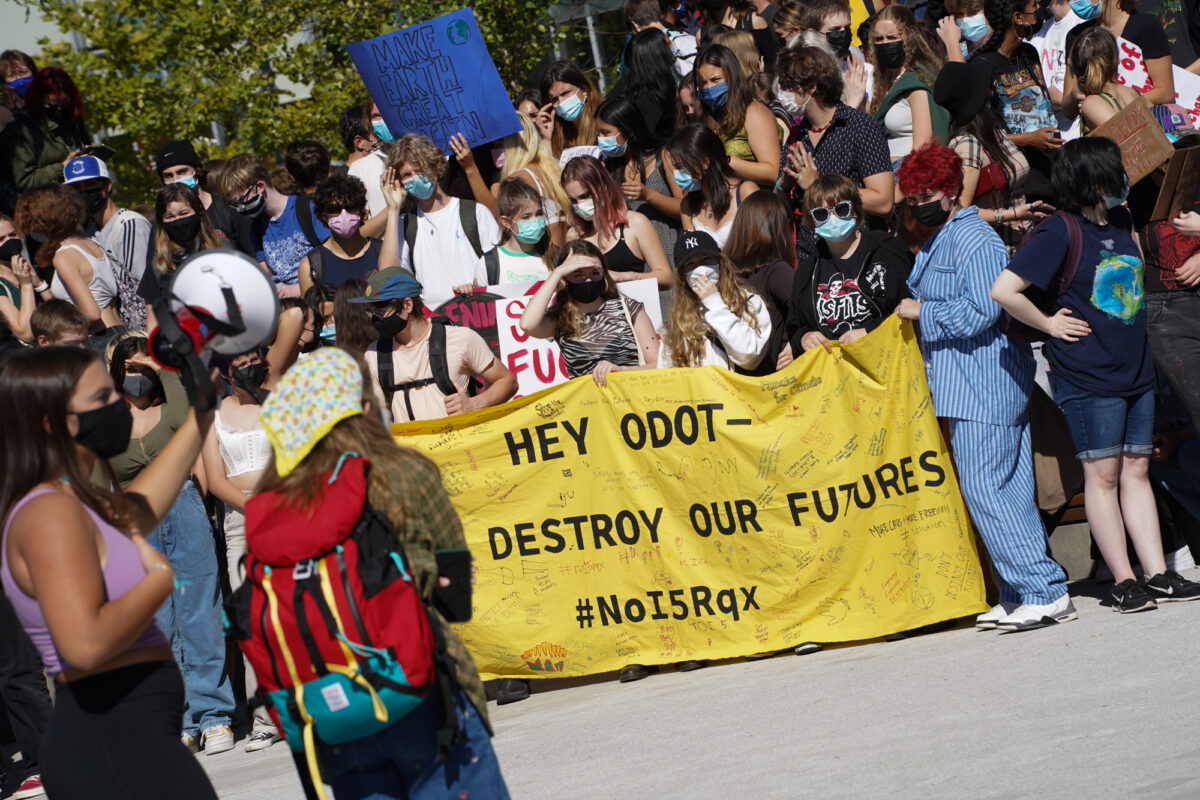
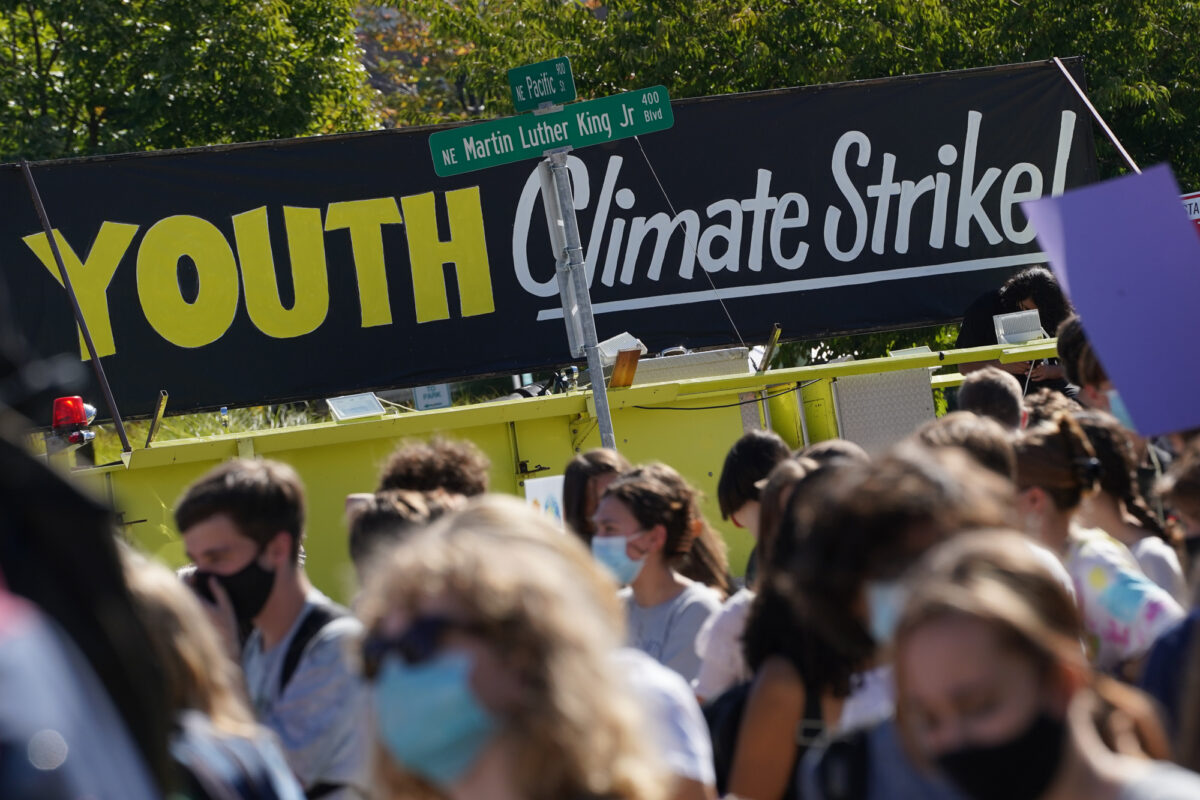

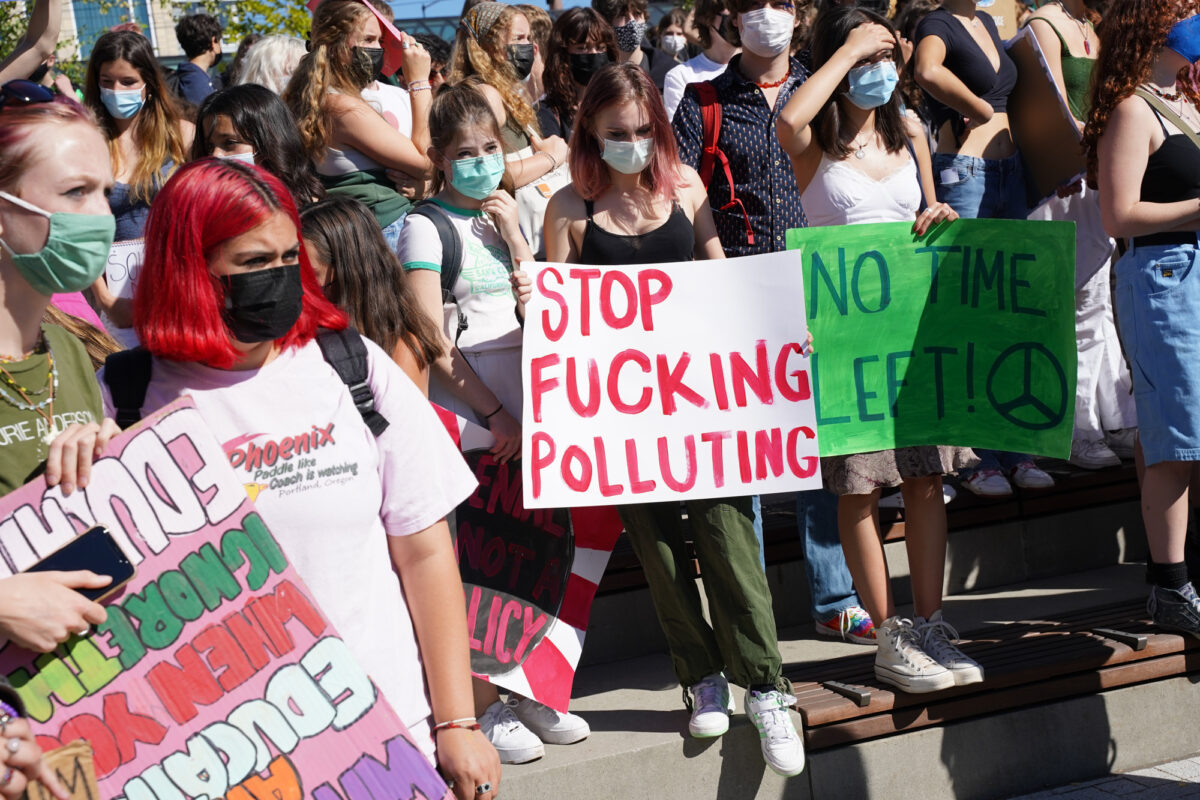
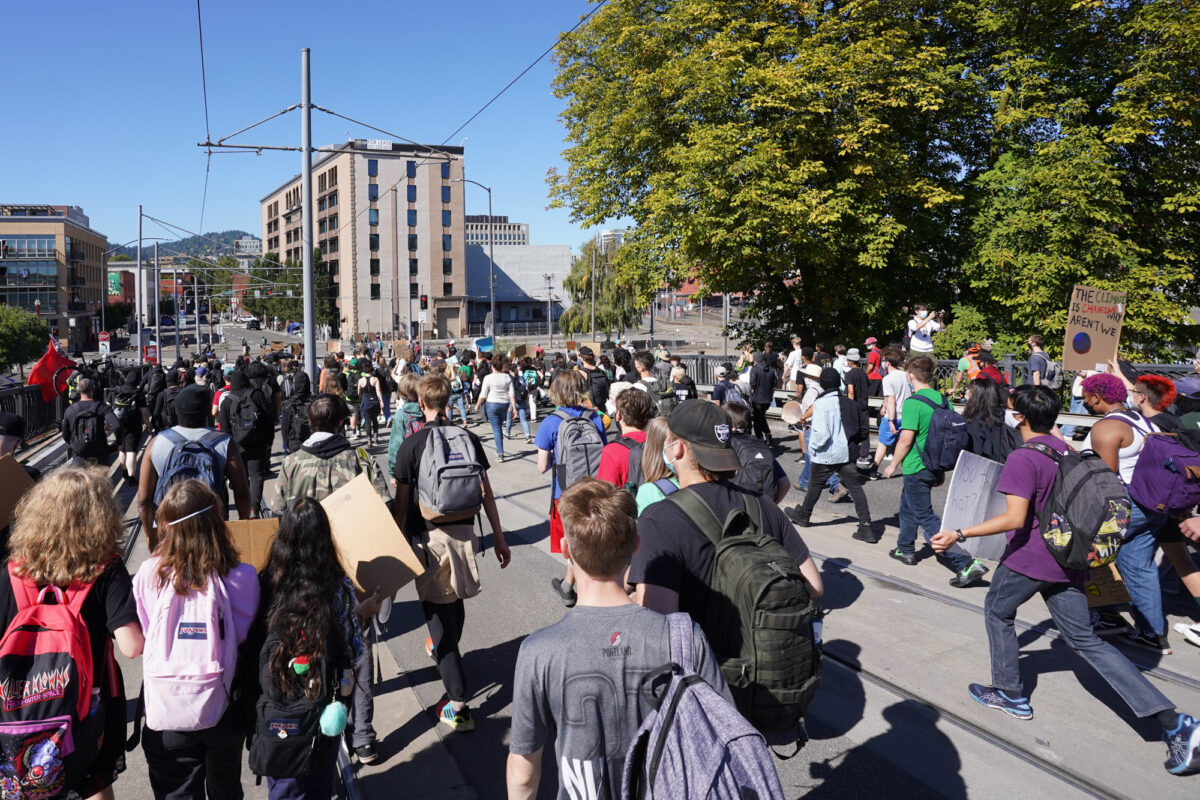
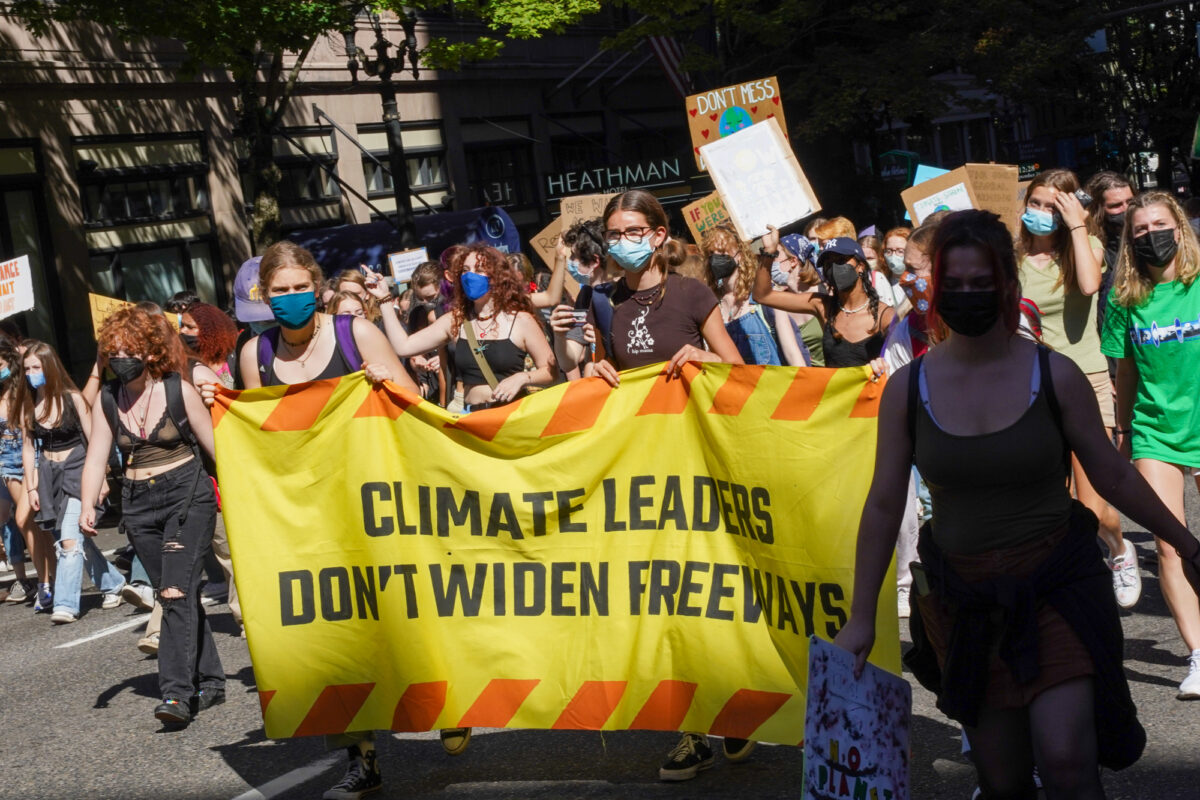
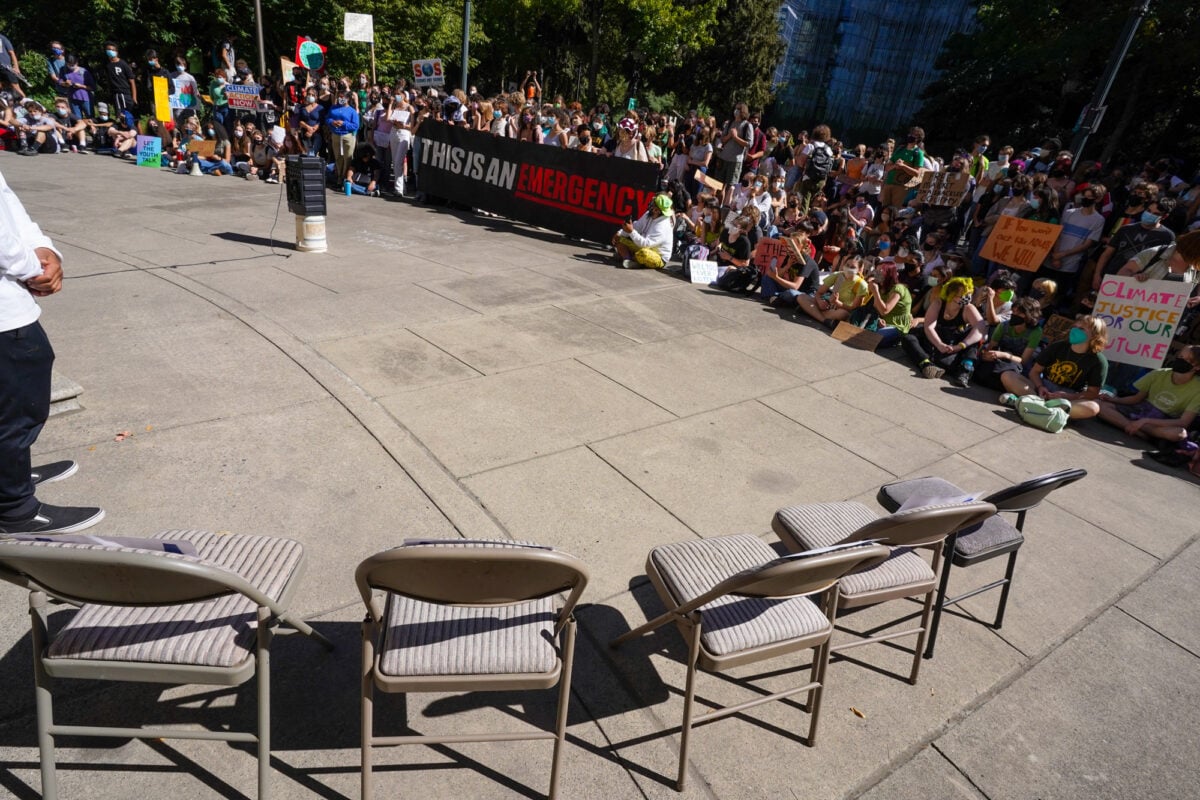
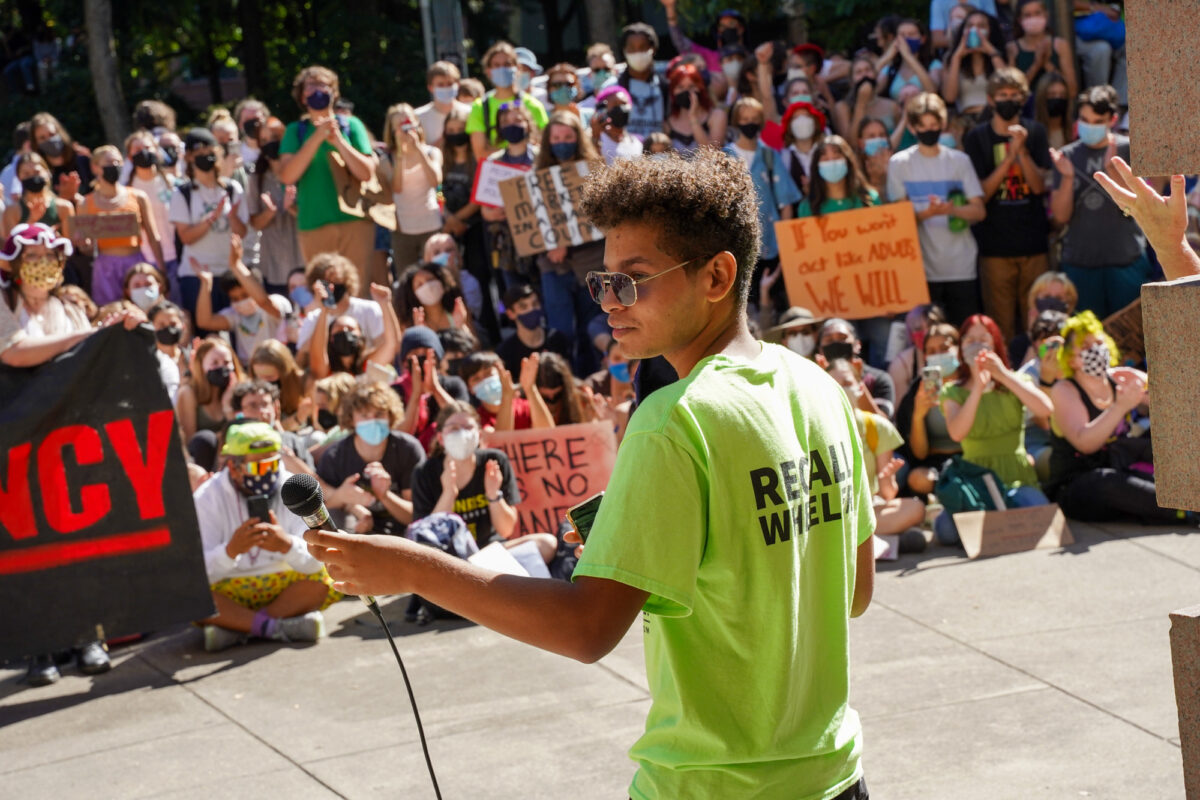
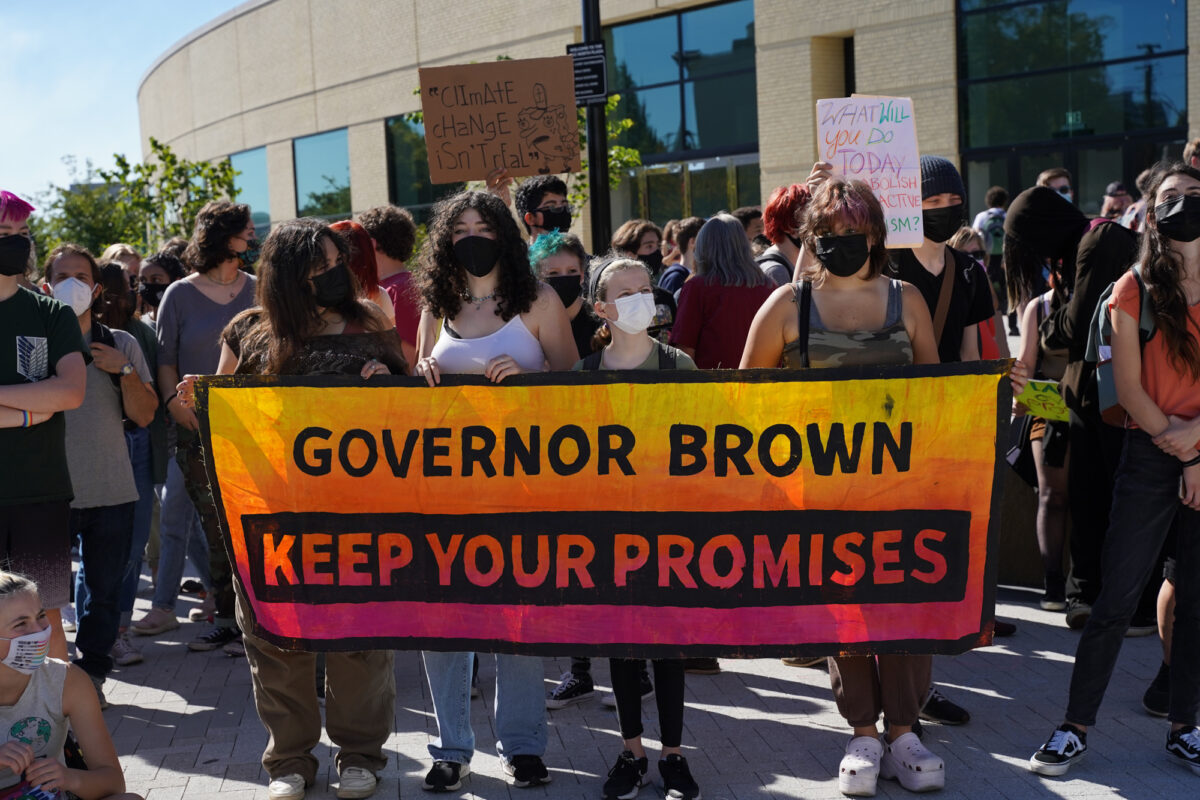



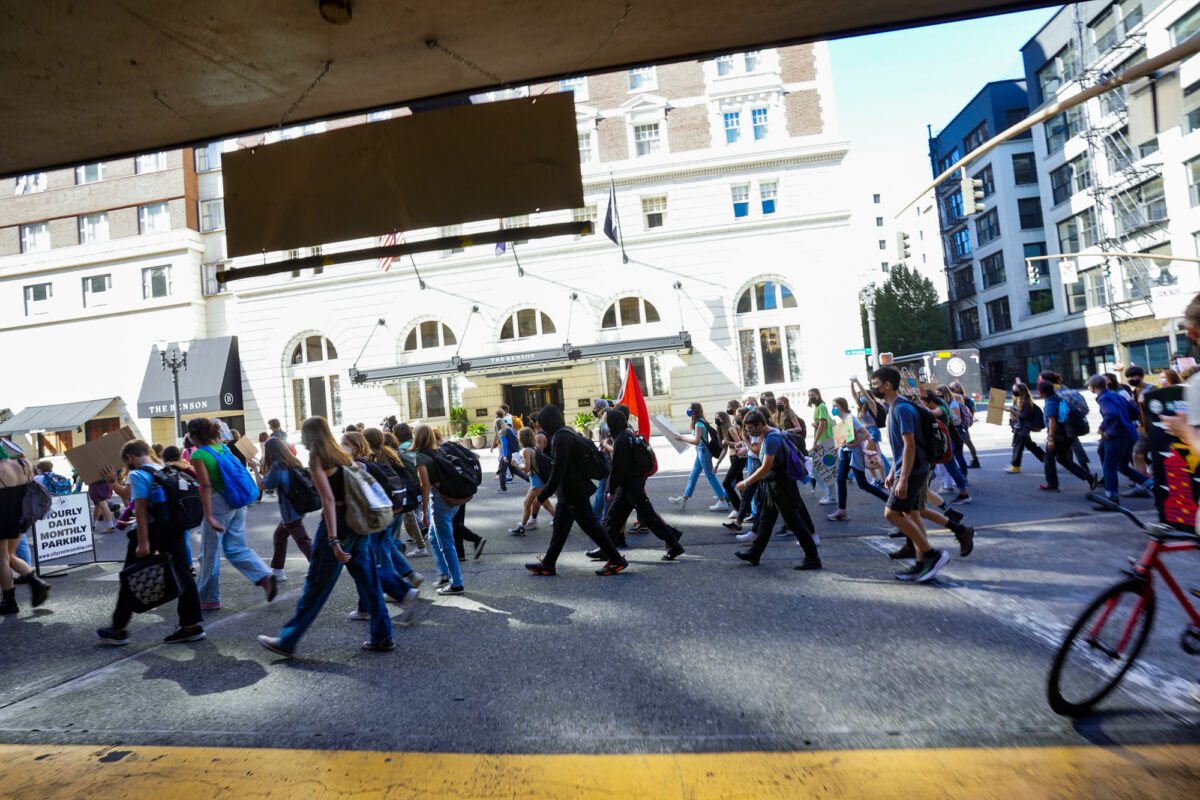


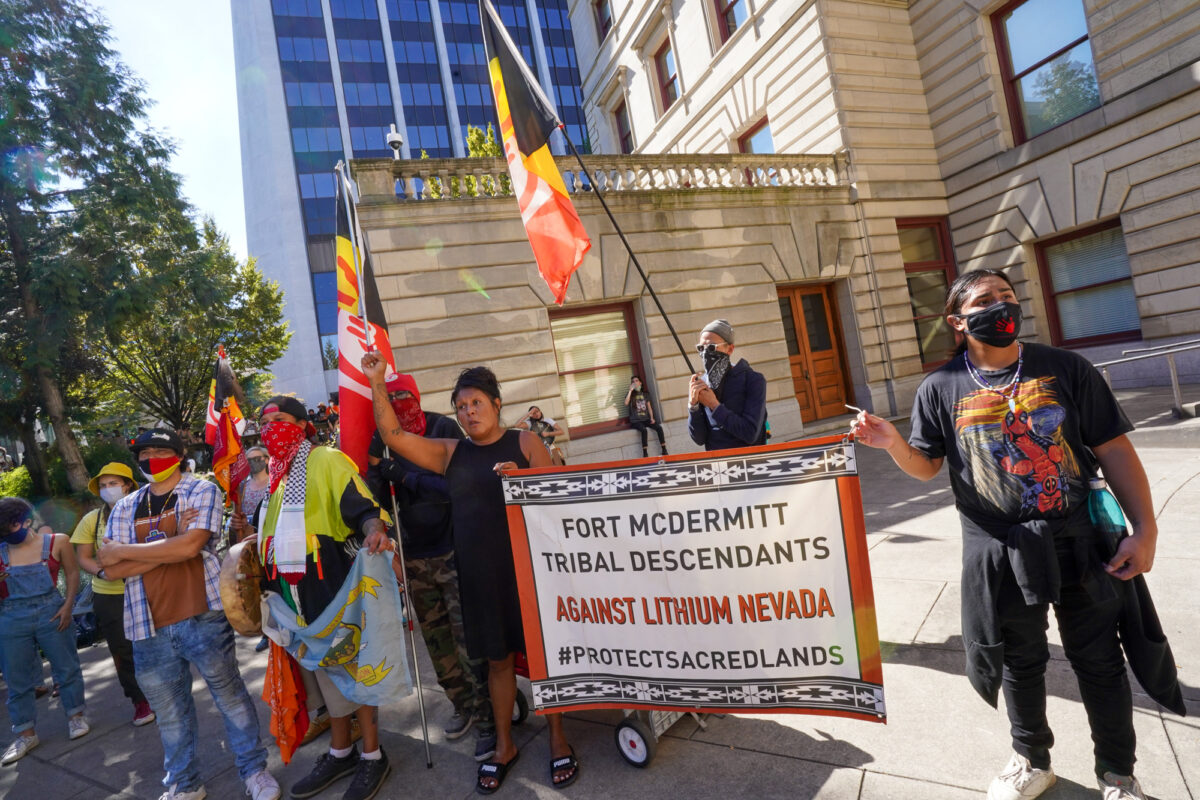

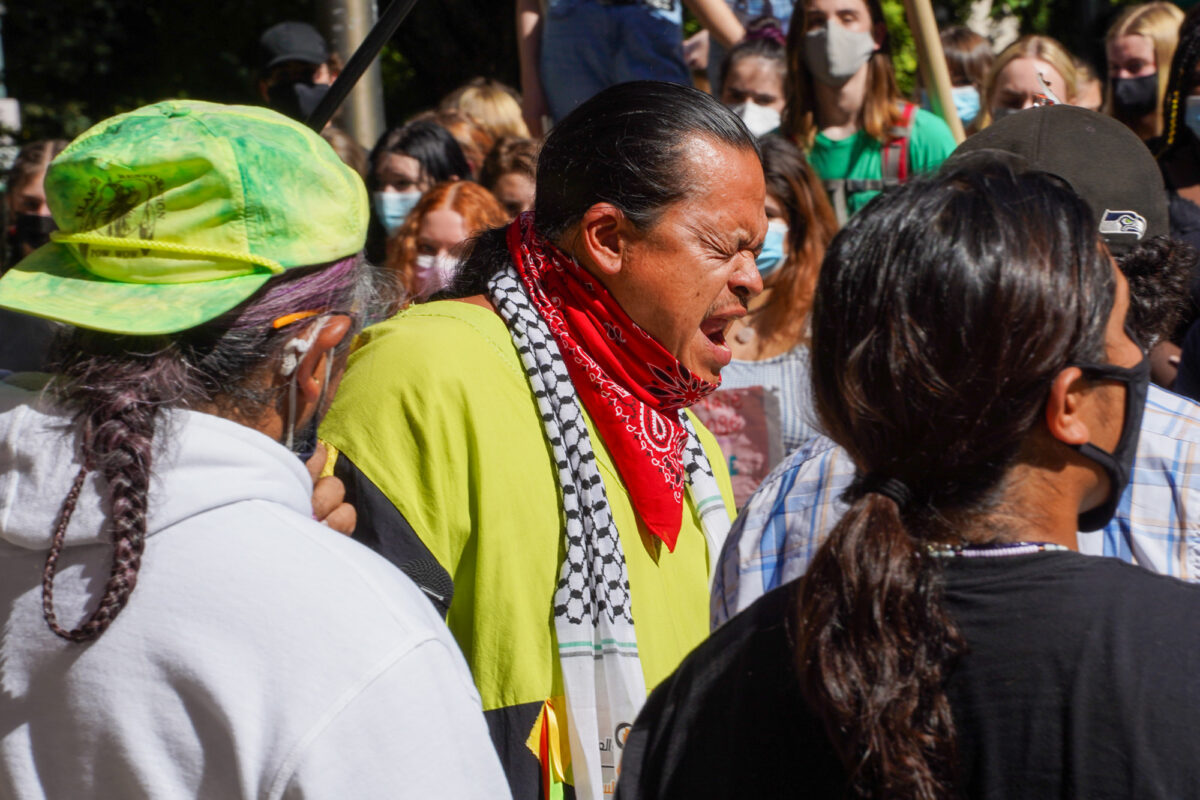

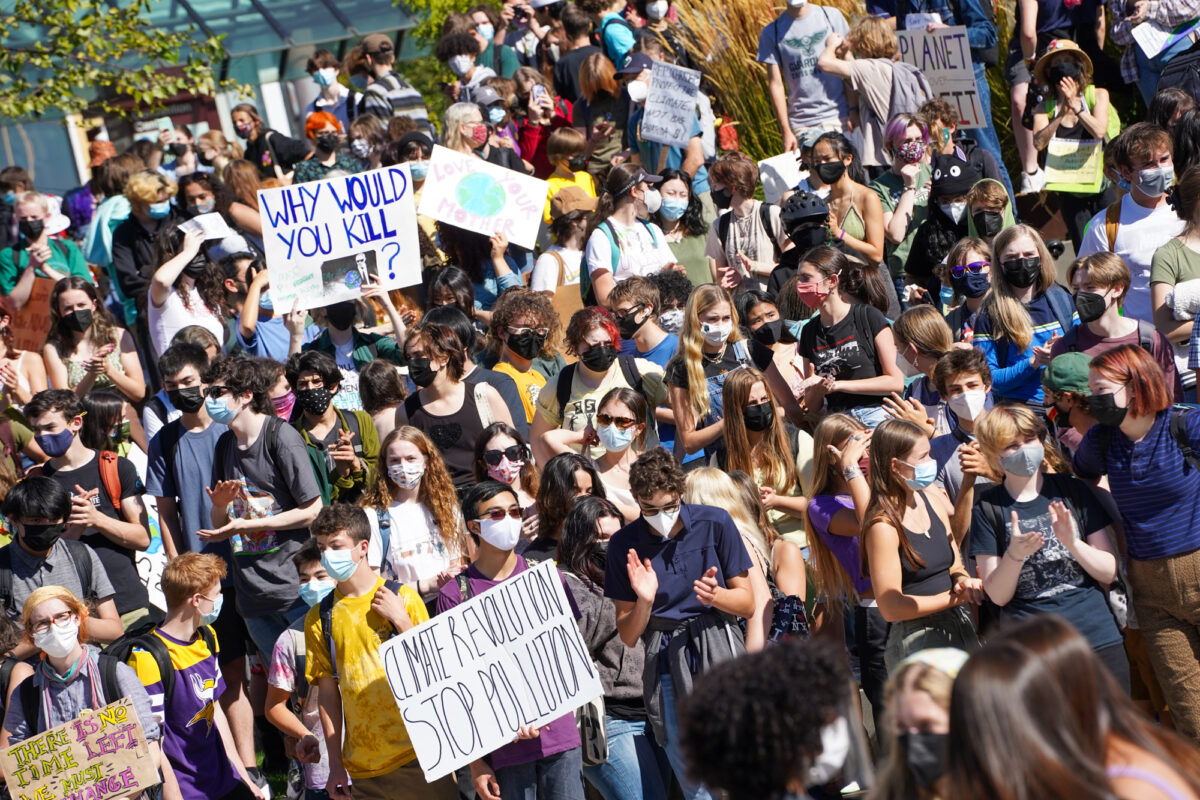
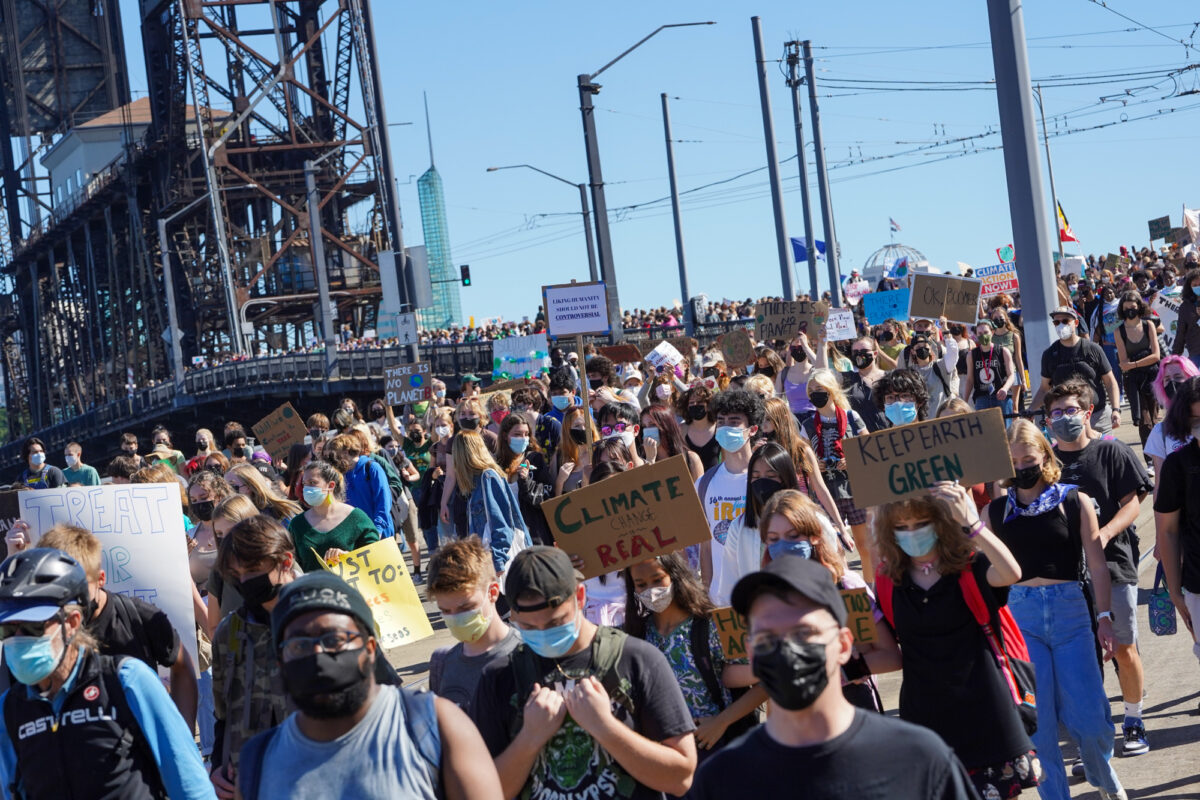
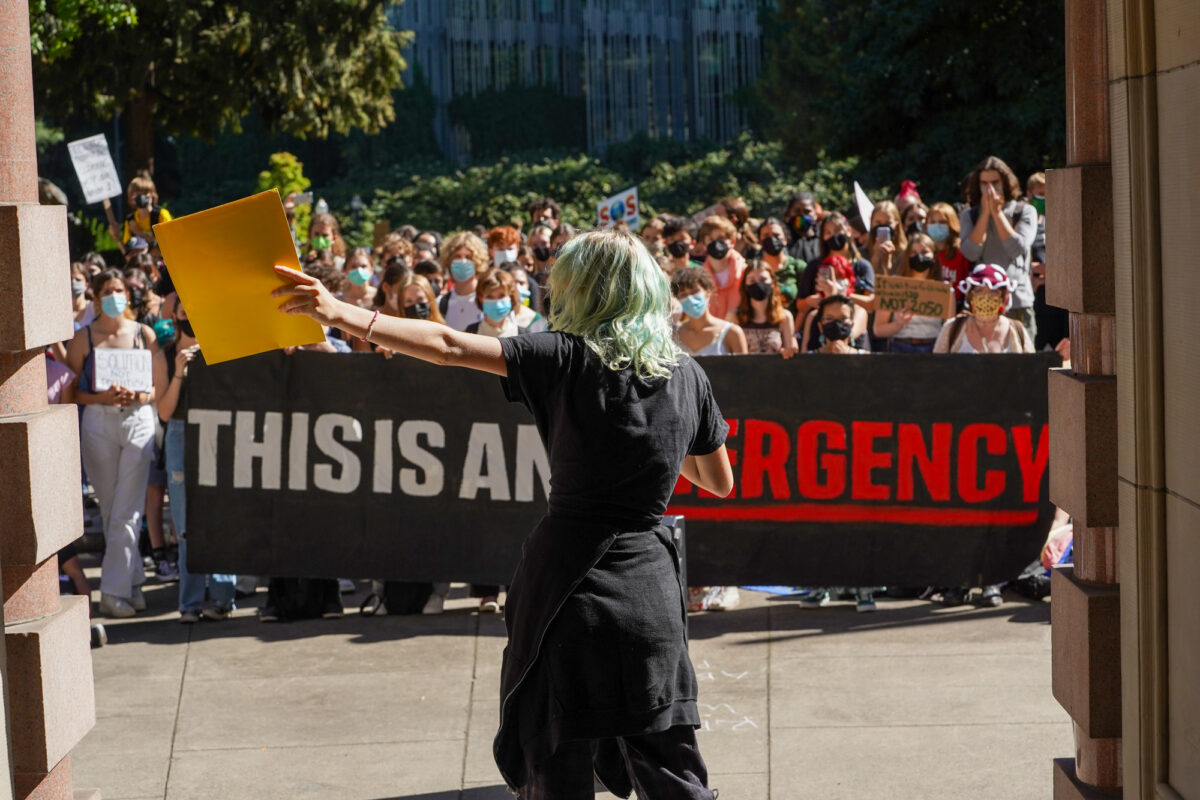
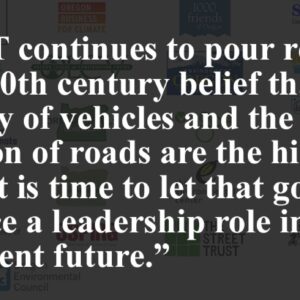
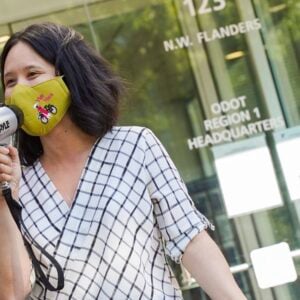
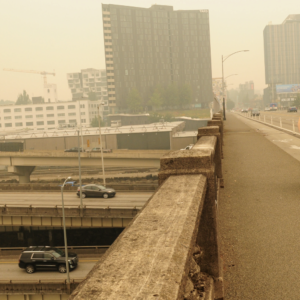

Thanks for reading.
BikePortland has served this community with independent community journalism since 2005. We rely on subscriptions from readers like you to survive. Your financial support is vital in keeping this valuable resource alive and well.
Please subscribe today to strengthen and expand our work.
Things are looking up for the climate as it seems like the beginning of the end for happy motoring. Many thought the age of the automobile would end due to energy shortages. But it looks like it will end because we can’t make cars any more. Sure many blame the empty dealerships on a chip shortage or some other temporary glitch, but I for one think the culprit is the decline in industrial output first predicted by the limits to growth model back in the 1970’s. Our ability to crank out 5000 lb metal and plastic living rooms on wheels for the masses is sputtering and collapsing in to the dust. I for one celebrate the end of happy motoring and think it is time to roll up our sleeves and think up a new way to live. So kids, now is the time to crank up the car crushers and get to work recycling as we are at a golden moment where every car sent on its way to a new life will probably not be replaced and the earth can breath easier for it.
I highly doubt it; cars will certainly transform, likely into something very different than the human piloted, gasoline powered machines that they are today, but individual motorized mobility in some form will almost certainly be a big part of our lives moving forward.
I always thought Oregon imported all their cars – are any manufactured in the state? I see plenty of new cars and SUVs here in NC, unfortunately, including ones assembled here.
Some people might not be aware of the current situation, which is that the production of nearly all new cars has dropped in half or more due to shortages of semiconductors and other supplies. Most car dealerships are now nearly empty of new cars, at least the models that anyone wants. At this point the number of cars leaving the system ( wrecks, old age, lack of parts etc) greatly exceeds the resupply rate. This means the number of cars on the road is decreasing and if this situation continues ( which I expect it will) the auto menace will slowly diminish until there are Too few of them to be worth the trouble of maintaining the infrastructure. Then one day they will be gone like supersonic commercial air travel.
Well, we still have air travel. Just not “pushing the limits of what is possible” air travel.
Supersonic was wasteful and overly expensive.
I am confident that once the world is back on track, production will ramp up.
Hi Bikeninja,
I’m a Krugmaniac (a rabid follower of economist Paul Krugman, nobel laureate, NYT columnist). He has talked in depth about the hiccups in production and the shipping constraints being seen as we haltingly emerge from the pandemic. He pointed out that a surprisingly large percentage of supposed “inflation” is due to a spike in the price of used cars. Sticky prices, vulnerabilities of just-in-time manufacturing—his subscription “Briefings,” $10/mo are well worth it, I think.
I would be nice if your thesis were true, but the semiconductor and other shortages are probably just temporary. If global supply chains are permanently broken, then the manufacturing of components can be brought back to North America. More expensive, sure, but better than not getting the parts at all.
It’s not simple to analyze.
Lisa, Paul is an excellent Neo-classical economist. But the problem is that school of economics treats energy and resources as perfectly substitutable. All of their models assume that when one thing begins runs out its price will go up and a perfect substitute will enabled by that higher price. Our problems with making cars (and everything else) is that we have hit the point in time ( as predicted by the world 2 model in the Limits to growth study done over 40 years ago) where industrial output begins to fall due to a combination of rising energy costs, resource depletion ( iron, copper etc) and the effects of pollution ( excess C02 is just a kind of pollution). In addition we are grappling with the end of Moores Law. Much of industrial growth the last 30 years was fueled by computer chips that got cheaper and more powerful every year. That model died about 2019 and now chips will get more powerful but will also cost more which has thrown the semiconductor industry in to a tailspin. So it is likely we will see only a feeble bounce back in auto production but at even higher prices. This will reduce the market and reduce the economies of scale which will further drive up prices and reduce the market still more. At some point only the rich will afford cars, but the the infrastructure to support cars requires a massive number of users ( and payers) so it will slowly fade away. But bikes will remain, and our living and working patterns will adjust to accommodate this new reality.
Talk about plastic living rooms on wheels? Your trip anywhere is just as likely to be blocked by a behemoth motor home driven by a cranky, old baby boomer who still doesn’t believe in climate change. The RV business in booming.
My son just got his new Bronco. He drove us up to the mountains and we did some off-roading. It was really something!
The car business is booming. Every dealership is begging for workers.
It looks like Ford disagrees with your market analysis.
https://www.aol.com/finance/ford-boosts-electric-vehicle-industry-230000358.html?fbclid=IwAR393oJx51PhzWC842TUmM1gJYj4eEhaLLixFU6GuuTi2eYQRe5o2nntWmk&error=login_required&error_description=login_required
What an awesome event, and an inspiring movement! Thanks for covering it here.
Maybe some of these folks would be worth interviewing for this blog in the near future?
The thoughts expressed here are simply not realistic. The days of car ownership and single occupant vehicles are far from over. There will always be those who prefer, or have no other option, or are required by physical condition to drive themselves to work, to school, to medical appointments, to shop, to recreate, etc., etc. Why is it that this argument is framed as an all-in “us or them” contest? Life works better when comments are moderated, all opinions are respected and society seeks balance. Doesn’t it disturb anyone to see youth “demanding” what they want? It’s good they are involved in real world issues, but what are we teaching them about how to seek change? Will they similarly make “demands” of their future employers, spouses, families, churches, etc? That is hardly sustainable behavior and will only serve to transform society into an increasingly hostile exchange between factions with differing views and values. Where do we see those holding opposing views come together to reasonably debate, listen to one another and seek compromise?
(I left out the rest of the list because making demands of power is very different than making demands of your peers)
Not at all – in fact, this is about the only thing that gives me hope. Power never relinquishes power without force. I absolutely hope they make demands of their future employers and future governments as forcefully (setting side the very valid question of how much force these sorts of protests actually project) – labor can use all the help it can get.
This is the way it’s always been. The only reason why it’s “felt” less hostile in recent decades is because certain factions won.
Except that it does, regularly. Trump notwithstanding, very few American (or European) leaders have failed to relinquish power when their terms in office were over. Many fewer have succeeded.
Peaceful transitions of power is one characteristic that separates Western liberal democracy from most other other forms of government.
I think it’s terribly myopic to consider the power here as vested in individuals holding individual offices. Consider why US foreign and domestic policy has largely gone in the same direction under Biden, Trump, Obama, Bush, Clinton, etc, and so on. Swapping out names in an office is not giving up power when the next name comes from the same background/class/cabal and does the same things.
Bringing it back to the closer-to-home, topic at hand: I can almost assure no candidate backed by the Democratic or Republican party for Oregon governor will project any different kind of power than the current Oregon governor/Democratic/Republican parties with regards to freeway expansions and other automobile-centric development. Hence the need for these kids – and all the rest of us – to keep making demands of power.
I don’t disagree with making demands of our elected officials (I do it quite often myself, though I don’t generally couch it as such).
I was just pointing out that people voluntarily give up power all the time, which is one of the great innovations of western liberal democracy. In places/times without liberal democracy, people tend(ed) to cling to power as long as they can (often until death, natural or otherwise, or imprisonment). And we change the power of offices themselves — right here in Portland, we’re currently undertaking a process that will potentially dramatically change the power structure at the city level. That state officials tend to support generally similar policies related to cars is more a reflection of what those who elected them want than a sign that force is needed to change them.
Do you really believe that force is the only way to change, for example, legislative policy on ODOT funding?
What’s unsustainable is this world they’ll be living in a lot longer than we will, and that’s our fault. I don’t see many leaders and politicians do much more than pay lip service to these very real issues around climate. Many of these youth activists have already been attempting to engage with these folks for years, testifying in Salem about diesel, attending Oregon Transportation Committee meetings about freeway expansions, talking to the mayor. That’s gotten them just about nowhere, and making demands of adults, the folks who have messed things up so much, seems perfectly reasonable to me.
How about a federal gas tax hike to get the price up to around $5 per gallon as a start.
Money can go to climate friendly transportation investments. These kids will save our ass.
I spent the week before last working in Ontario, California where the gas prices were near $5.00 a gallon. I saw nothing to indicate they were driving less. I did see a lot of work on I10 near I15. The one thing that perplexes me when I work in that area is the lack of electric autos. I have seen more Tesla’s in a day on the Oregon coast then a week around that area of LA.
Everyone is a climate ranger until they hit real life, have kids, realize kids need transportation, they have to go to work(not every job is a stay at home gig with life long door dash) yada yada…
Sounds like you have discovered the cycle of automobile dependency!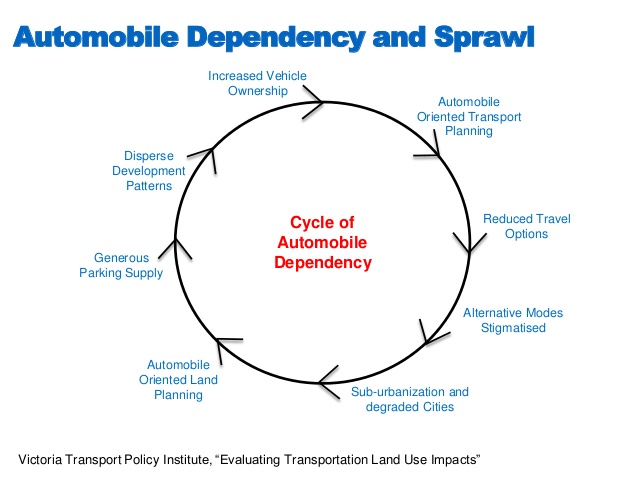
Ain’t that the Truth? It’s very easy to tell others how they need to live – no so easy when those demands fall upon your own shoulders.
The very best thing these kids could do as North Americans is to not have children of their own.
“It’s very easy to tell others how they need to live – no so easy when those demands fall upon your own shoulders.”
I agree, but in the case of climate change, it’s not an argument against the youths, it’s an argument supporting them.
For example–when we add freeway lanes today, many of the worst impacts happen in the future. For older people pushing to add lanes, the immediate impact to them may be a quicker commute. The people who get the worst negative impacts are young now. The older ones who got the original benefit won’t be around to have to deal with the future negatives.
So the way I see it is that the older people pushing for adding freeway lanes are the ones “tell(ing) others how they need to live”, because they’re forcing the negative impacts of their self-serving decisions on others who must deal with them in the future.
And yes, it ISN’T easy to make choices that place demands or burdens on your own shoulders–that’s the message I get FROM the youths. They want older people to stop making decisions based on what’s easy for their own older generation, without concern for how they impact future generations.
That’s a good point all around.
The very best thing most people in the world can do is stop having so many children.
When I was born there were 3.55 billion people in the world. There are now over 7.5 billion. More than double in 54 years.
My parents, at least, only had 2. I look at my relatives with 3-5 kids for each couple and just don’t understand it.
My GF and I got together nearly 32 years ago and realized there were more than enough people in the world. We aren’t such special snowflakes that the world is a worse place with out our genes carrying on.
Many “climate rangers” are adults with kids and jobs.
Indeed. I have both a job and children, and I am guessing that I would support stronger climate protection measures than most other people on this forum. That said, I would never call myself a “climate ranger”.
Keyboard warriors? Yeah, I get that part.
Inevitably the truly “car free” types are usually long-term singles. If there’s a family, then (surprise) they enjoy the privilege of one spouse pulling in six figures while the other enjoys a pleasant inner-Portland neighborhood (where, coincidentally, PBOT has invested most of its cycling and walking infrastructure) doing child-rearing and homemaking tasks by bike. The articles profiling these folks always seem to omit that the six-figure-earner spouse drives to work every day…
Exactly. Look at the folks antagonizing drivers on group rides all summer (“naked bike ride” series being the worst offender): it’s almost entirely people who are in their mid-20s or younger. They’ll forget all about this stuff once they settle down into a career and start a family; for now they’re just enjoying the privileges of an growing up middle-class or better… extending adolescence for another 10-15 years after leaving their parents’ nests.
I speak from experience: I was adamantly “car free” back in those days, too. Then life happened.